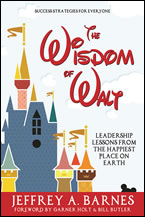July 10, 2015
The Wisdom of Walt
Leadership Lessons from the Happiest Place on Earth
Jeffrey A. Barnes
Aviva Publishing (2015)
ISBN: 9781943164165
New Book Uses Disneyland as Classroom for Leadership Development
 When Jeff Barnes came up with the idea of teaching a “History of Disneyland” class, he was afraid his colleagues would laugh and never let him teach what they would perceive as a “Mickey Mouse” course, but he went through with the idea anyway, and teaching at a university in Southern California, not far from Disneyland, meant he soon had plenty of students who were not only interested but enthusiastic.
When Jeff Barnes came up with the idea of teaching a “History of Disneyland” class, he was afraid his colleagues would laugh and never let him teach what they would perceive as a “Mickey Mouse” course, but he went through with the idea anyway, and teaching at a university in Southern California, not far from Disneyland, meant he soon had plenty of students who were not only interested but enthusiastic.
What is so fascinating and educational about the history of Disneyland? More than you could ever imagine, and enough that Dr. Barnes has now written an entire book on the subject, but it’s not just a history book—The Wisdom of Walt: Leadership Lessons from the Happiest Place on Earth presents Walt Disney’s vision and development of Disneyland as a source of inspiration for all of us in our own pursuit of our dreams and life purposes. Each story of Disneyland that Dr. Barnes shares contains a lesson in it to help us become better visionaries, overcome our obstacles, and lead ourselves and others toward success.
The book takes us on a tour through Disneyland’s history and tells us the inspiring stories behind many of the attractions, as well as many smaller items we might not notice right away. Anyone who has visited Disneyland will have noticed the big stuff like Space Mountain or Sleeping Beauty Castle, but what about that park bench Walt Disney sat on that’s on display, and what about the berm? Chances are you don’t even know what a berm is or that Disneyland has one, but it does, and it has a valuable lesson to teach us, as Dr. Barnes informs us.
By reading this book, I learned so much about Disneyland that I didn’t know. I’ve never even been there, though I’ve been to Walt Disney World, but through Dr. Barnes’ stories, I was completely captivated by this magical park. I was fascinated by how Walt was influenced by the World Fairs and later assisted in developing one after Disneyland became a success. I was intrigued by Walt’s positive vision for the future as evidenced in the Tomorrowland section of the park. I loved reading about his commitment to his visitors’ experiences and how he personally talked to the park’s guests. I loved learning about how Walt was a pioneer of television who used it to come into viewers’ homes, gain their trust, and bring them to Disneyland. I was impressed by his willingness to get involved in details, even to the point of rearranging chairs before presentations and riding the rides to understand his guests’ experiences. Nearly fifty years after Walt’s passing and sixty years after Disneyland opened, there is still so much to learn from Walt’s vision.
As a true visionary, Walt Disney not only created the model for all theme parks to come, but he was a leader who could get others to buy into his vision and help him develop it, plus he passed that vision on to everyone who visits Disneyland. Dr. Barnes chronicles that vision from the beginning when Walt created Mickey Mouse as his own “Walter ego,” through the many obstacles, failures, and naysayers Walt faced and overcame to achieve his tremendous success. Dr. Barnes shows us how we can do the same, and he teaches us the lessons that each part of the park has to offer. Chapters titles such as “Making a Main Street Impression,” “Keeping Fantasy at the Heart of Everything” and “Creating E-Ticket Experiences” all reflect Disney-specific ideas translated into skills people can develop to achieve success. Dr. Barnes teaches us how Walt Disney treated his employees as a model for how we should treat ours. He teaches us about the power of patience through waiting in lines at Disneyland, and he reminds us that education must be entertaining—so we must be edutainers, just as Walt Disney himself was, and as Dr. Barnes tries to be in his History of Disneyland class.
Each chapter of this book is filled with Disneyland stories that make it entertaining and educational, but the educational aspect also comes in the exercises Dr. Barnes provides to encourage readers to have their own goals and dreams, to overcome the obstacles blocking them in life, and always to be looking toward the future, not the past. He asks us to think about what we truly want in life, how to overcome the obstacles facing us, what habits we can create to make our dreams a reality, and many more questions that spur us on toward our goals.
The Wisdom of Walt is a true classic inspired by the Disney tradition. Dr. Barnes has captured a magic in these pages that Walt Disney himself would have embraced. Walt wanted to entertain us, but most of all, he wanted to inspire us to make the world a better place—so we would have a better tomorrow. As he himself said, “All of our dreams can come true, if we have the courage to pursue them.” In these pages, I believe many readers will find some of that courage.
For more information about Jeffrey A. Barnes and The Wisdom of Walt, visit www.TheWisdomofWalt.com.
— Tyler R. Tichelaar, Ph.D., and award-winning author of The Children of Arthur series

